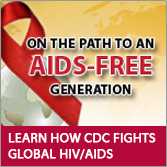Ethiopia
HIV/AIDS in Ethiopia
- 1.2% Estimated HIV Prevalence (Age 15–49) (2013)
- 45,000 Estimated AIDS Deaths (2013)
- 900,000 Estimated Orphans due to AIDS (2013)
- 270,460 Reported Number of Adults Receiving Antiretroviral Therapy (ART) (2012)
- 68% Estimated ART Coverage per WHO 2010 Guidelines (2012)
SOURCE:
UNAIDS Gap Report, 2014; UNAIDS Global Report, 2013

Strategic Focus
The CDC-Ethiopia office opened in 2001 and provides technical assistance in comprehensive HIV prevention, blood safety, HIV/AIDS care and treatment, antiretroviral therapy (ART), TB and malaria control, laboratory systems, and strategic information, including health management information systems (HMIS), surveillance, informatics, and research.
Strengthening Public Health Systems
CDC partners with the Ministry of Health (MOH) and the Ethiopian Public Health Institute (EPHI), which oversees all surveillance and clinical labs in Ethiopia. CDC collaborates with EPHI in lab training and technical assistance to strengthen the nation's health system through improved lab infrastructure and increased human capacity. CDC’s Ethiopia Strategic Information and Laboratory Branches are co-located within EPHI.
Building Public Health Workforce Capacity
CDC is pairing US-based universities and the Ethiopian Diaspora with local universities to develop a sustainable health workforce through innovative approaches to planning, training, retention, and deployment. CDC is helping to train Integrated Emergency Surgical Officers (IESO) at six Ethiopian universities and has started an innovative new medical education initiative in 13 medical schools across the country. CDC also supports several Master’s degree programs in the health sciences.
Leveraging Established Global Platforms
CDC coordinates with domestic and global health programs to respond to emerging public health threats such as pandemic influenza through national preparedness and surveillance efforts. The Field Epidemiology and Laboratory Training Program (FELTP) trains new public health leaders to investigate and respond to a range of emerging epidemics and public health challenges.
Key Activities and Accomplishments
Care and Treatment
CDC, in collaboration with the Government of Ethiopia and the MOH, has endorsed new national guidelines for putting all pregnant women on ART and treatment of all eligible ART patients with a CD4 count of 500. This new strategy was launched in early 2014. Ethiopia enrolled more than two new infected clients on treatment for every new infection by the end of FY13. The total on treatment in FY13 exceeded 317,000 people.
Evidence-Based Prevention
CDC also implements evidence-based prevention by targeting “hot spots” and most-at-risk populations for HIV infection to assure maximum disease impact. For instance, 10 Confidential Sex Worker Clinics for STIs/HIV have been established in Ethiopia and over 20,000 female sex workers have been reached since 2009.
Counseling and Testing
With CDC’s support, Ethiopia leads PEPFAR countries in HIV counseling and testing, with particular success in the integration of provider-initiated counseling and testing (PICT). Also, in 2013, CDC started index case testing, a high yield testing program where the contact and families of newly positive individuals are traced. Since the program started, over 35,000 families and contacts of index cases have accessed the service.
Blood Safety
CDC has been working with the MOH and the Regional Health Bureaus on establishing a national blood safety program since 2004. In 2010, management of the program was transitioned to the MOH and Regional Health Bureaus. The number of blood banks in Ethiopia has doubled from 12 to 25 and voluntary blood donation has increased from less than 10% in 2004, to 91% in 2014.
Success Stories
Contact Us:
- Centers for Disease Control and Prevention
1600 Clifton Rd
Atlanta, GA 30333 - 800-CDC-INFO
(800-232-4636)
TTY: (888) 232-6348
24 Hours/Every Day - cdcinfo@cdc.gov
 ShareCompartir
ShareCompartir



